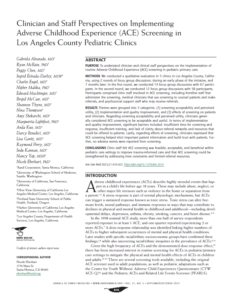
Adverse Childhood Experiences (ACEs) are traumatic events linked to long-term health consequences. Pediatric clinics in Los Angeles County have integrated ACE screenings as part of California’s ACEs Aware initiative to enhance trauma-informed care. This study evaluated clinician and staff perspectives on implementing routine ACE screenings in five pediatric clinics through focus group discussions conducted at two intervals over 16 months.
The findings highlighted the acceptability and perceived utility of ACE screenings, with clinicians reporting that the screenings elicited critical information and built trust with patients. Implementation barriers included time constraints, insufficient training, and challenges with referral processes and resource availability. Staff also expressed the need for additional tools and emotional support to manage the impact of screening on their workload.
The study underscores the importance of addressing logistical challenges and providing comprehensive training to ensure effective implementation of ACE screenings in pediatric settings. It also emphasizes the need for robust referral networks to maximize the potential benefits of screening for children and families.